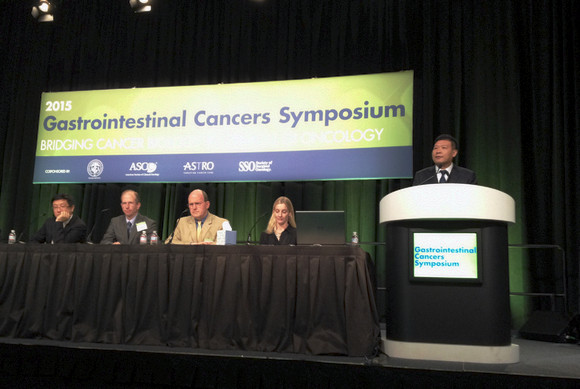Source: Sun Yat-sen University Cancer Center
Written by: Sun Yat-sen University Cancer Center
Edited by: Wang Dongmei
Prof. Xu Ruihua became the first Chinese physician to give a speech at the 2015 American Society of Clinical Oncology’s Gastrointestinal Cancers Symposium in San Francisco.
The annual American Society of Clinical Oncology’s Gastrointestinal Cancers Symposium (ASCO GI) was held in San Francisco on January 15-17, 2015. Colorectal cancer (CRC) is the third most frequently diagnosed cancer and is the fifth leading cause of cancer death in China. However, for a long period of time, no studies from China has ever been reported in the ASCO GI Symposium. On January 17, Dr. Xu Ruihua, Professor of Medical Oncology at Sun Yat-sen University Cancer Center, made the first step to the platform of ASCO GI Symposium and gave a report entitled “A randomized, double-blind, parallel-group, placebo-controlled, multicenter, phase II clinical study of famitinib in the treatment of advanced metastatic colorectal cancer.”

Prof. Xu Ruihua (first from right, standing) delivers a speech at the ASCO GI Symposium.
Famitinib is a small-molecular, multi-target receptor tyrosine kinase inhibitor which primarily acts against angiogenesis. This is a multi-center, randomized, double-blind, placebo-controlled, phase II clinical study (ClinicalTrials.gov Registration No.: NCT01762293). Totally 154 patients with advanced colorectal cancer who failed second or later-line treatments were randomized in a 2:1 ratio to receive either famitinib or placebo at 25 mg each day in each treatment cycle. The primary endpoint was progression-free survival (PFS), and the secondary endpoints include overall survival (OS), objective response rate (ORR), disease control rate (DCR), quality of life (QoL) and safety. The statistical analyses of endpoints were using intent-to-treat population. Of 154 patients randomized, the mPFS was 2.8 and 1.5 months in the treatment group and control group, respectively (p=0.0034; HR=0.58). The ORR was 2.02% and 0.00% (p=0.54) and the DCR was 57.58% and 30.91% (p=0.0023) in the treatment group and control group, respectively. Analysis of OS data is ongoing. The frequently reported adverse events (AEs) include neutropenia, thrombocytopenia, hypertension, proteinuria, and hand-foot syndrome and were most grade 1/2. The incidences of serious adverse events (SAEs) for the famitinib and placebo groups were 11.11% and 9.09%, respectively (p=0.7884). Overall, famitinib was well tolerated and toxicities were manageable. In conclusion, famitinib improved the PFS in patients with advanced metastatic colorectal cancer resulting in higher ORR and DCR in the treatment group with good safety and tolerability.
The theme of this year’s ASCO GI Symposium is "Bridging cancer biology to clinical GI oncology". It is not only a bridge between tumor biology and clinical studies, but also a bridge connecting China and the world. Using his fluent and professional English, Prof. Xu impressed the audience with the ability and confidence of Chinese researchers to carry out high quality phase III multi-center clinical trials, and proved to the world that China was ready for clinical trial.



